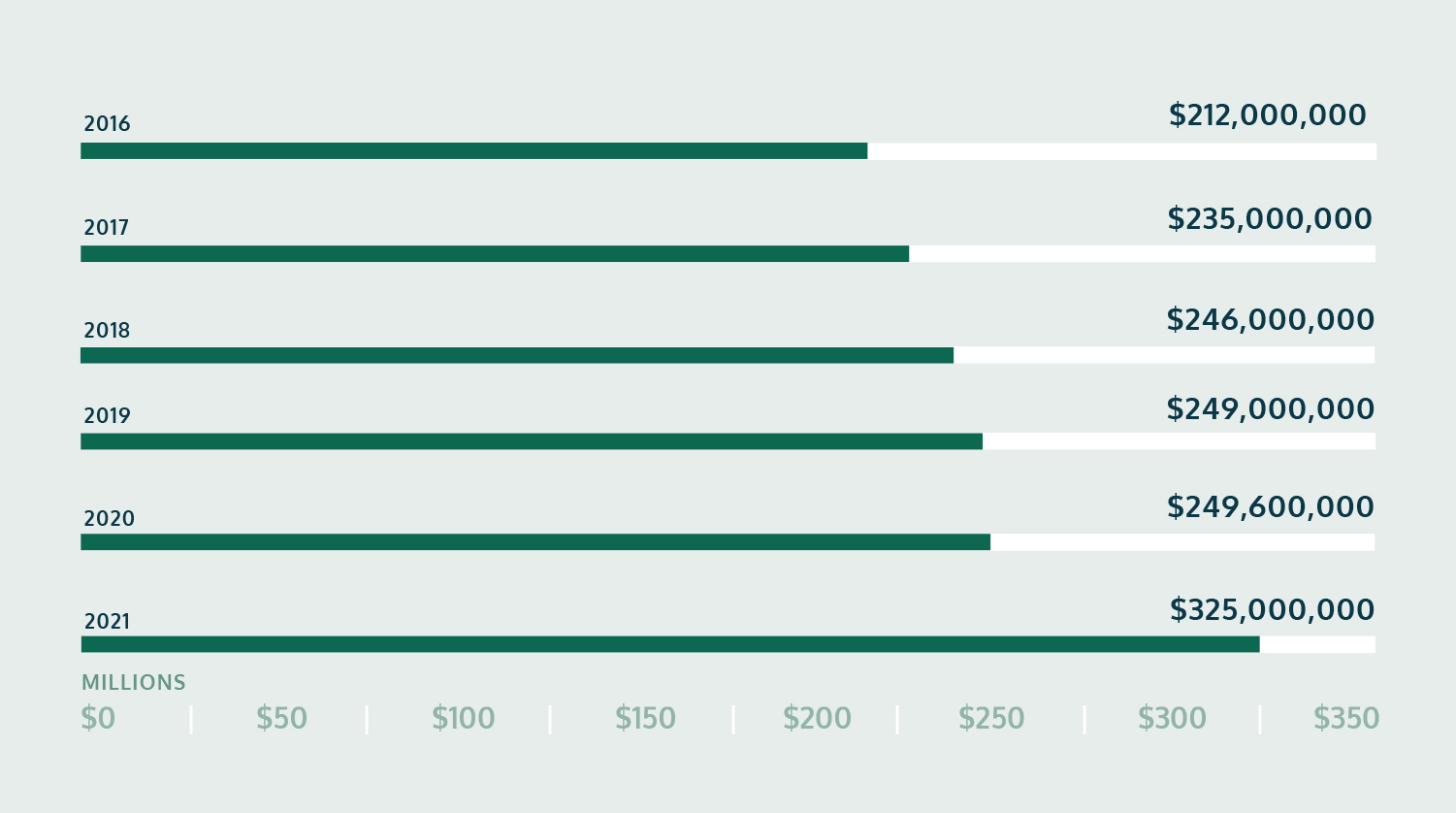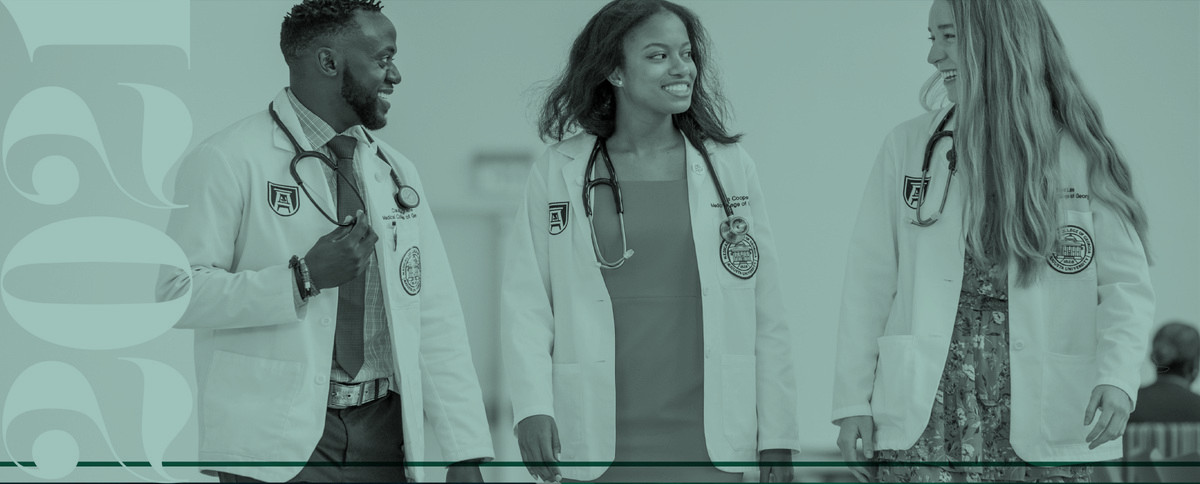

PRESIDENT’S NOTE
BENJAMIN DEAL, DMD (’74)
Chairman of the Board
This past year has been filled with peril and promise, with disappointment and elation, and with all that has transpired, the Medical College of Georgia Foundation has prospered and continued to honor the original intent of our founders. The support of the Medical College of Georgia at Augusta University continues unabated through the gifts of generous donors and management of our endowment with our investment partner Agility.
We have partnered with the Community Foundation for the CSRA, the Boys and Girls Club of Greater Augusta and the Augusta National Golf Club to begin construction of two new buildings on our property on 15th Street. The HUB for Community Innovation and a new home for the Boys and Girls Club will soon reside at the old Central Square shopping center. The HUB will house numerous community outreach organizations along with a free health clinic that will give students an opportunity to serve residents of the two historic communities of Laney Walker and Harrisburg. We feel like this will be a catalyst for much more development in and around our campus and give us the ability to further support the Medical College of Georgia and all the schools at Augusta University both financially and structurally. It will also provide a long-awaited gateway to the Health Sciences Campus while transforming the surrounding and adjacent communities.
This year, our more than $325 million endowment has allowed us to increase the number of Harrison scholarships awarded while adding new scholarships in dentistry and medicine for underrepresented minorities. During the past year, despite being in a pandemic, we added more than 30 new funds to the foundation.
The Foundation is also responding to the statewide physician shortage by supporting the MCG 3+ Primary Care Pathway which will allow future physicians an opportunity to not only receive their education in a shortened amount of time, but it will offer them a reprieve from repaying their tuition if they agree to remain in Georgia and practice in an underserved area. This is a pioneer program for students and residents of Georgia.
Finally, it has been my honor to serve the Foundation as its chairman for the past three years. Our reach and positive influence have gone beyond the school and community while remaining true to the original objective established almost 70 years ago by our founders.
With your help and support, the future is bright.
We feel like this will be a catalyst for much more development in and around our campus and give us the ability to further support the Medical College of Georgia and all the schools at Augusta University both financially and structurally.
GIFTS BY FISCAL YEAR
FISCAL YEAR 2021 MARKET OVERVIEW
Global equity markets ended fiscal year 2021 with exceptionally strong returns after experiencing significant volatility throughout the year. While the first half of the fiscal year saw most of the volatility, the second half saw global equity markets continue their recovery.
Successful vaccination campaigns and reopenings helped increase economic activity in many parts of the globe while fiscal and monetary policy remained supportive. With stable interest rates and calm credit markets, corporate earnings have been remarkably strong.
Global equity markets exhibited considerable resiliency during the fiscal year, returning +39.3%, as measured by the MSCI All Country World Index. U.S. equity markets and emerging markets led the way, outpacing developed international markets. Global fixed income posted modestly positive returns for the fiscal year, returning +2.6% as measured by the Barclays Global Aggregate bond index. Commodities and REITs posted significant gains, ending the fiscal year with returns of +45.6% and +34.8% respectively.
While capital markets continue their recovery, there are still risks that remain top of mind, which we categorize into near-term and longer-term concerns. In the near-term, the impact of COVID variants remains of concern not only from a health perspective but from an economic one should lockdowns be broadly reinstated. Longer-term, regulators may need to address deficits and rising inflationary pressures. In addition, corporations may face higher borrowing costs, rising commodity prices and potential tax increases. The Portfolio continues to be managed with these risks in mind, while also maintaining a focus on identifying opportunities.

PERFORMANCE OVER TIME
The Medical College of Georgia Foundation’s portfolio (the “Portfolio”) grew to $325 million for the fiscal year ending June 30, 2021. Over the fiscal year, the Portfolio returned +30.6%, a result that is ahead of both its policy benchmark and asset class blended benchmark.
We are very pleased with the Portfolio’s performance over the fiscal year as it occurred during a period of considerable volatility and changing market leadership. It was particularly gratifying to see strength from several areas of the portfolio and astute navigation of the markets by the underlying investment managers.
ENDOWMENT VALUE
ASSET ALLOCATION
We believe the Portfolio remains well positioned for the market environment as we’ve maintained diversification across both traditional and alternative asset classes. The Portfolio contains a thoughtful mix of return drivers, volatility reducers and portfolio hedges, with an eye towards risk management and downside protection. We are always canvassing the landscape for interesting opportunities and took advantage of several shorter-term opportunities during the fiscal year which proved to be beneficial for the Portfolio. Overall, we remain focused on the long-term investment objectives of the Foundation when considering the asset allocation of the Portfolio
- Global Equities
- Real Assets
- Absolute Return
- Global Fixed Income
- Private Capital

The Mission of the Medical College of Georgia Foundation is to improve the quality of life of the people of Georgia, the nation, and the world by supporting the advancement of education, research, and patient care at the Medical College of Georgia.
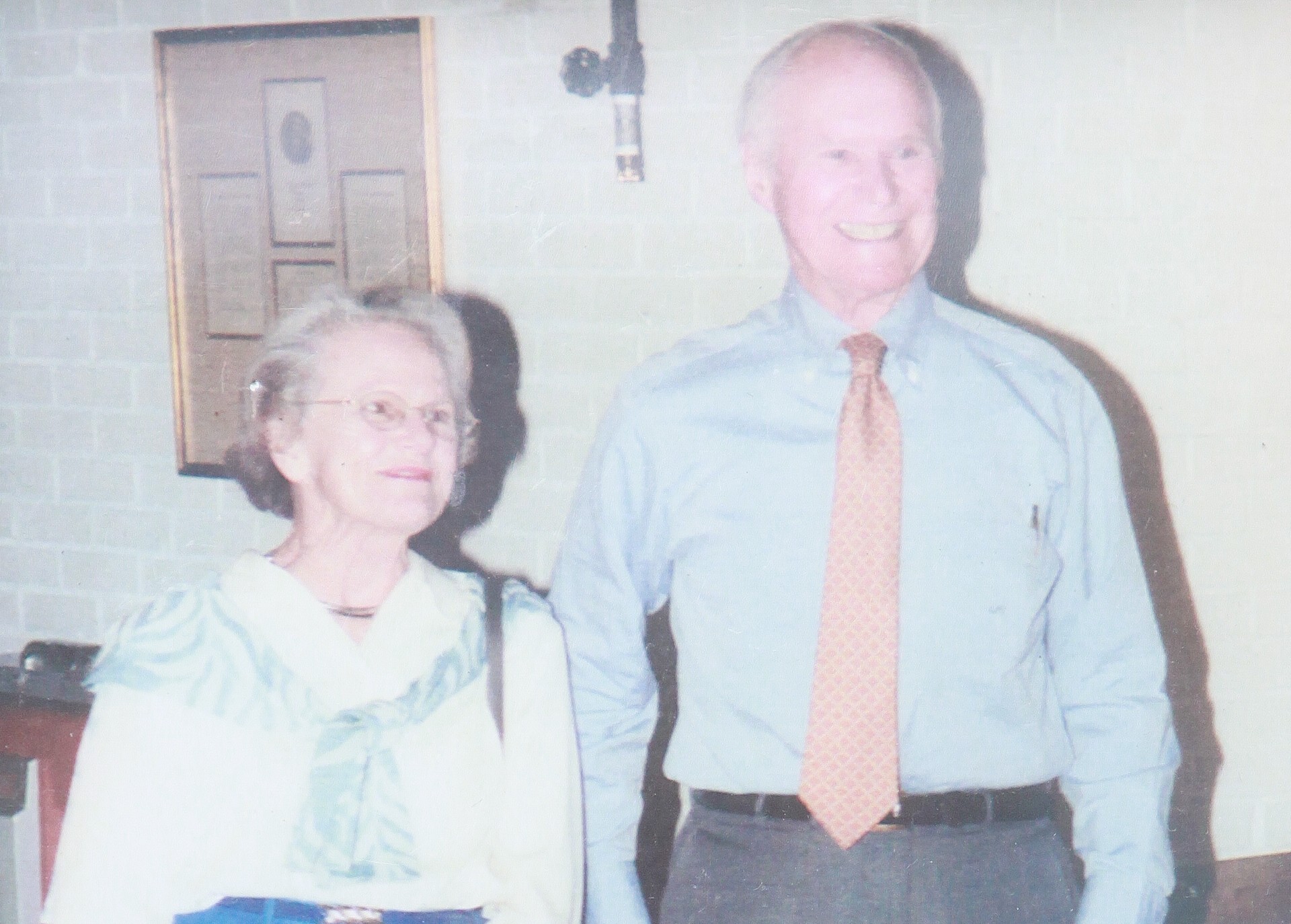
Betty and Lovick Corn
$1 million gift from Corn family supplements their previous support to pediatric cancer research
Betty and Lovick Corn’s extraordinary endowment 20 years ago to pediatric cancer researcher Dr. David Munn at the Medical College of Georgia continues to bear fruit.
The Corns of Columbus, Georgia, first met Munn in 2002. They were so taken by his mission to develop less-toxic treatments for children with cancer, that they committed $1.5 million to his research on an immunotherapy drug he developed called idoximod. Munn believed that combining idoximod with chemotherapy and radiation would result in much improved outcomes as the body used its own immunotherapy system to assist in the fight against cancer and tumor growth.
This was extremely important where children are concerned, because cancer treatments could be very toxic on their young growing bodies. At that time, caring for children with cancer across the United States was disjointed and severely underfunded because far fewer children than adults suffer from cancer.
Though at the time of the meeting with Munn, the Corns had five healthy children, they were duly impressed with the vision for improved treatments for families who weren’t as fortunate. Fast forward to today and the $1.5 million gift the Corns bestowed back in 2002 proved invaluable in catapulting the groundbreaking research Dr. Munn was doing from theoretical concept to an actual clinical trial of indoximod.
The year 2015 proved monumental when Dr. Ted Johnson, a pediatric hematologist/oncologist opened the first clinical trial of indoximod for children with relapsed brain cancer and a difficult-to-treat cancer called diffuse intrinsic pontine glioma or DIPG.
Many families from across the U.S. have been helped by the extraordinary research and bedside application attributable to Munn and Johnson.
Though family patriarch Lovick passed away in 2013, and Betty has stepped back from the once active role she played in the family’s philanthropy, fourth and fifth generations of family members continue to fund the many advances Munn and Johnson are making to improve the treatment of children with cancer.
The Corns’ most recent gift of $1 million – which adds up to $4 million over the years – will continue to advance the groundbreaking research and treatment for childhood cancers.
“Their legacy is one that will continue to live on by the very nature of what they chose to give to, not because they built a building, not because they put a plaque in the ground by a tree,” said Gilbert Miller, the Corns’ grandson. “They are literally helping people like Dr. Munn give life and hope to other people. I cannot imagine a better legacy to steward than that.”
Peach State Health Plan invests $5.2 million in MCG to expedite physician training
Despite its recent ranking as the 8th largest state in the U.S. by population growth, Georgia consistently ranks among the 10th worst state for many of the country’s most prevalent medical conditions, averaging some of the highest rates of stroke, heart disease and cancer.
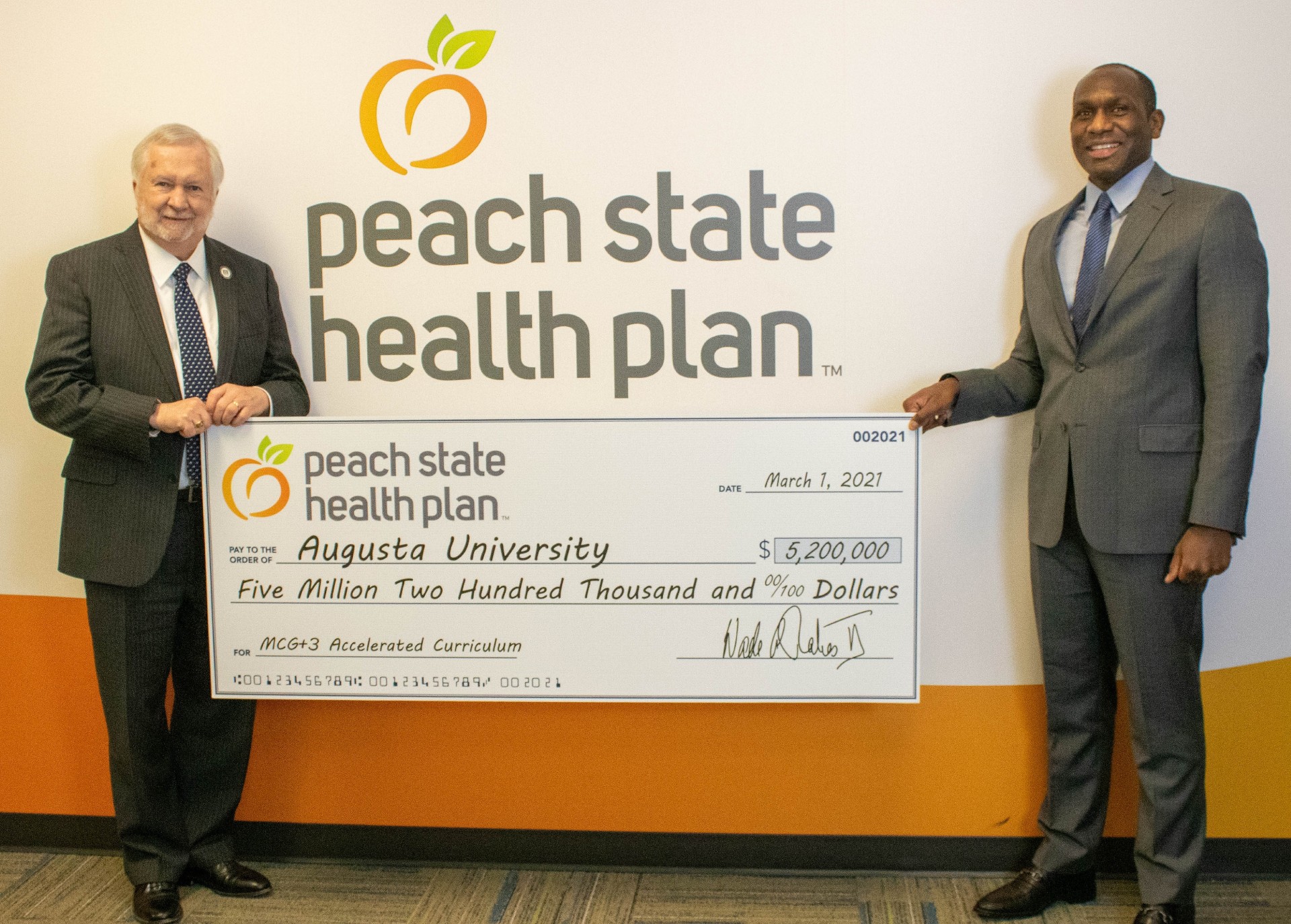
A major contributing factor for these disparities is Georgia’s ongoing shortage of primary care physicians and lack of access to basic health care services.
To address these critical shortages, the Medical College of Georgia at Augusta University redesigned its four-year core M.D. curriculum, creating the MCG 3+ program, one of the most significant curriculum redesign efforts in MCG history.
The MCG 3+ Primary Care Pathway will allow students to finish medical school in three years. In turn, these students must commit to practice primary care in rural or underserved counties in Georgia.
“The physician shortage, especially in rural and underserved areas, is a huge problem that will only worsen over time,” said Dr. David Hess, dean of MCG. “As the state’s public medical school, it is our mission and our responsibility to address the state’s growing physician shortage.”
Sharing a similar mission, Peach State Health Plan, which recently launched its Office of Rural Health and Strategic Initiatives, presented Augusta University President Brooks A. Keel with a $5.2 million grant in March 2021 to help fund the MCG 3+ program.
While their primary business is insurance services, Peach State Health Plan is on a mission to improve the health of its beneficiaries through focused, compassionate, coordinated care.
“By partnering with the Medical College of Georgia at Augusta University, we are doing our part to ensure that all Georgians have access to highly trained physicians and quality health care,” said Wade Rakes, CEO of Peach State Health Plan.
The visionary support of Peach State Health Plan to help address Georgia’s physician shortage got an additional boost when Governor Brian Kemp approved the 2022 state budget, which includes a $5.2 million match of the Peach State Health Plan gift for this pivotal initiative.
“We are putting more physicians in rural Georgia, and we started the 3+ Program,” President Keel told The Augusta Chronicle. “We have a very large philanthropic gift from Peach State Health that we’re excited about, and this budget match allows us to establish an over $10 million endowment that’s going to provide tuition for students who want to stay and practice in rural Georgia.”
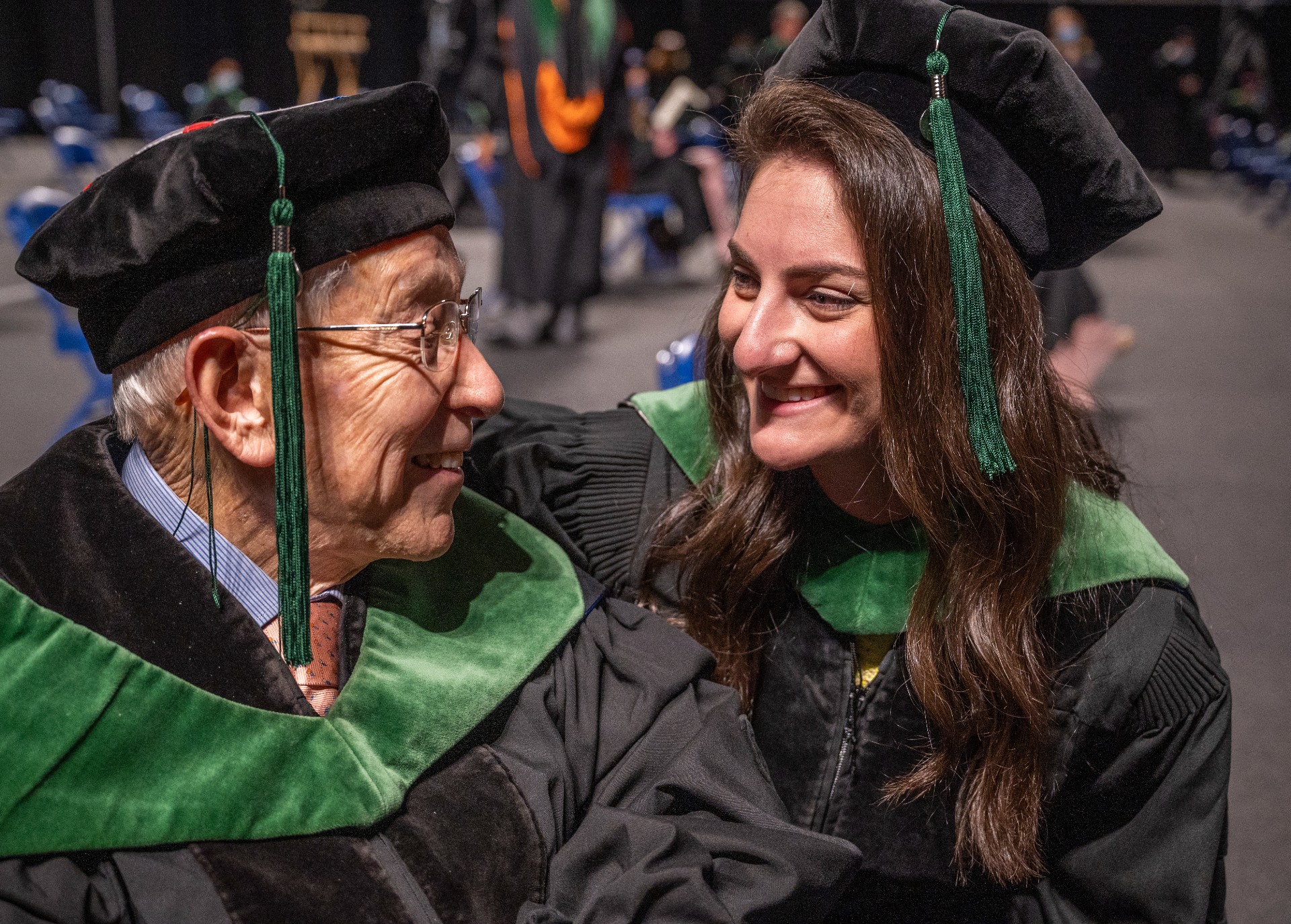
Dr. George Sessions and Dr. Katrina Hazim
Retired anesthesiologist commits estate gift to MCG 3+ program
Dr. George Sessions (MD ’55) understands how important primary care is for rural communities. Born and raised in southwest Georgia, he and his wife Martha donated one of the first gifts to the MCG 3+ Program, an expedited M.D. curriculum recently created by the Medical College of Georgia to train and place primary care physicians in communities across the state where they are needed most.
The Sessions have also committed an estate gift of $250,000 toward this vital initiative, because not only is supporting rural health important to the retired anesthesiologist, but so is giving back to the school that made him who he is today.
“I can tell you the best decision I ever made in my life was to go to MCG,” said Sessions, reflecting on his 90 years. “It was the avenue that made all the positive things in my life possible.”
After graduating from the Medical College of Georgia in 1955, Sessions completed a residency in anesthesiology at Charity Hospital in New Orleans, where he met his beloved Martha. They married and returned to Atlanta, where Sessions worked at Grady Hospital for two years before accomplishing a 37-year career at DeKalb Medical Center (now Emory DeKalb Medical Center).
Though it has been more than 65 years since he left MCG, Sessions remains grateful to his alma mater and outspoken about Georgia’s only public medical school. In fact, his influence was a driving factor in Dr. Katrina Hazim’s decision to go to MCG.
“Dr. Sessions spoke so highly of MCG and Augusta, so I knew it was a great place to train from him,” said Hazim, a Class of 2021 graduate. “He told me about Augusta, and when I ended up coming to MCG, he gave me a book about the history of MCG.” Hazim trusted this man’s advice. After all, the Sessions family had known her since she was born. The connection began in the late ‘70s when Hazim’s father Daniel came to the U.S. to attend college. As an exchange student, Daniel Hazim was placed with George and Martha Sessions as a host family. A bond was formed that remains strong today.
“We’re really a blended family,” Hazim said. “I see them probably at least once a month. It’s a special relationship.”
So special that Hazim invited Sessions to Augusta for the privilege of hooding her.
Because of the generosity of Dr. George and Martha Sessions, more men and women will be able to experience this rite of passage through the MCG 3+ program. And as support for the program increases, the state of Georgia will reap the benefits in improved health care.
Bloom Estate Gift Establishes MCG Medical Research Chair
Leon Bloom was never a patient at AU Health. He never attended Augusta University. But a visit to Augusta and a tour of the campus in the mid-1980s left an indelible impression upon him. So much so that he and his wife, a successful attorney, left a generous $1 million estate gift to establish the Leon and Dorothy Bloom Chair in Medical Research at the Medical College of Georgia.
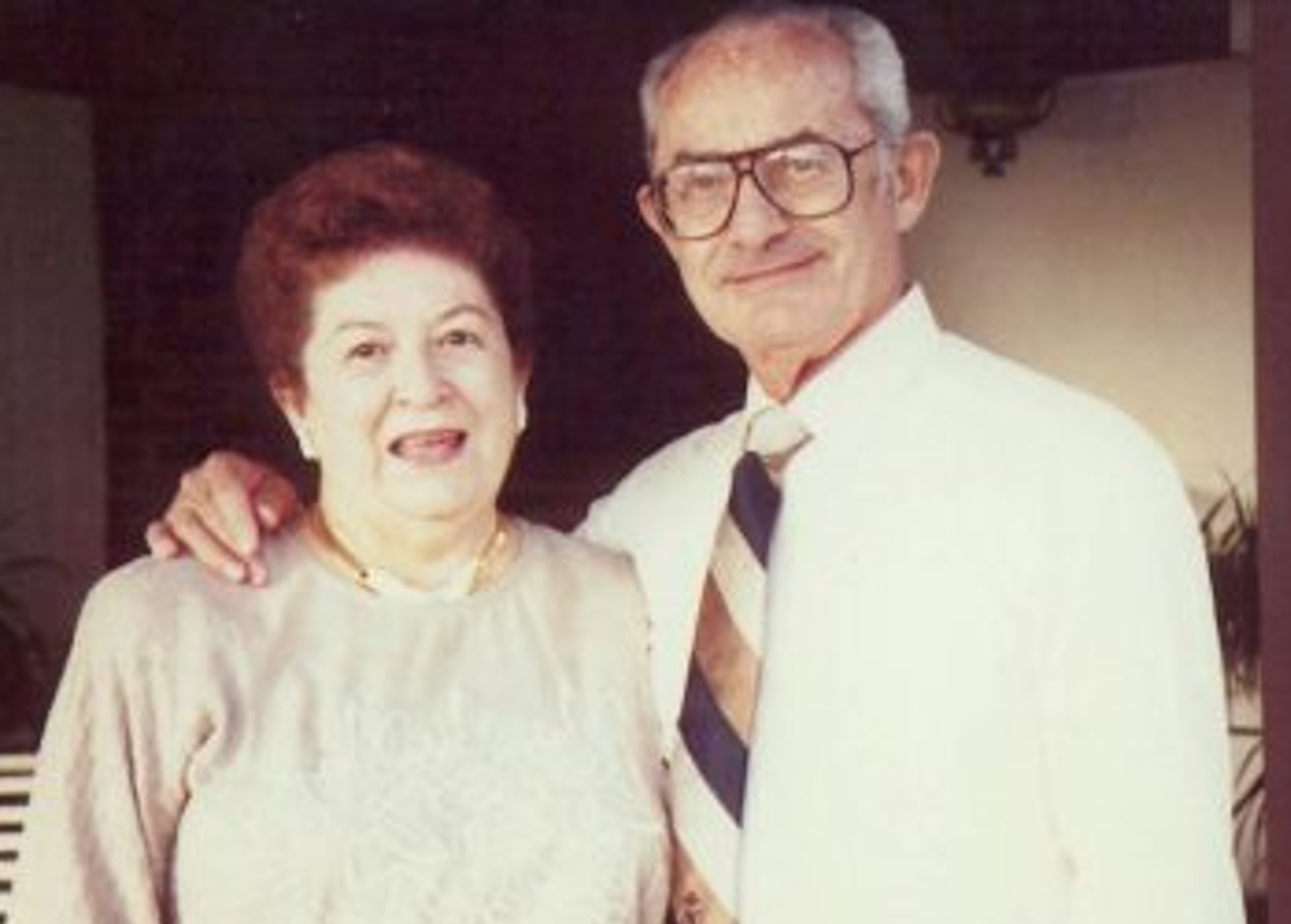
Dorothy and Leon Bloom
Bloom was a self-made man. He started a business in his home basement in the mid-1950s and named it BioLab. Conceived as a product to curb bacteria and disease in chicken hatcheries, it effectively increased hatch rates and was very successful in the poultry industry.
Not content to stop there, Bloom sold his interest in the agriculture business and decided to explore the implications of his product for the swimming pool industry. His idea took a while to gain traction; but by 1962 Bloom was flying his personal plane across the country to market and sell his new product called BioGuard, which has transformed the swimming pool cleaning industry.
Bloom sold his company in 1979 and retired comfortably to Florida. Since he and Dorothy had no children, they doted on their nieces and nephews. Larry Bloom spoke fondly of his Uncle Leon, saying that he could have sold his company for much more, but he lowered the price so his employees would have a funded pension plan.
This sort of caring was also evident in the Blooms’ commitment to philanthropy. The Blooms thought deeply about their legacy as demonstrated by their estate plans. Leon Bloom explicitly expressed the “desire that the financial residue of his life’s efforts be directed toward charitable activities and purposes.” Augusta University’s Medical College of Georgia is one of the fortunate places the Blooms decided was worthy of their generosity.
The Blooms’ connection to MCG is a loose one. Leon Bloom’s friend and attorney, the late Sidney Parks, had a son who was a 1984 graduate of MCG. David, the son, was working on his residency in otolaryngology/head and neck surgery. He loved his chosen profession and spoke enthusiastically about his outstanding education and training at MCG. Word of this got back to Bloom.

